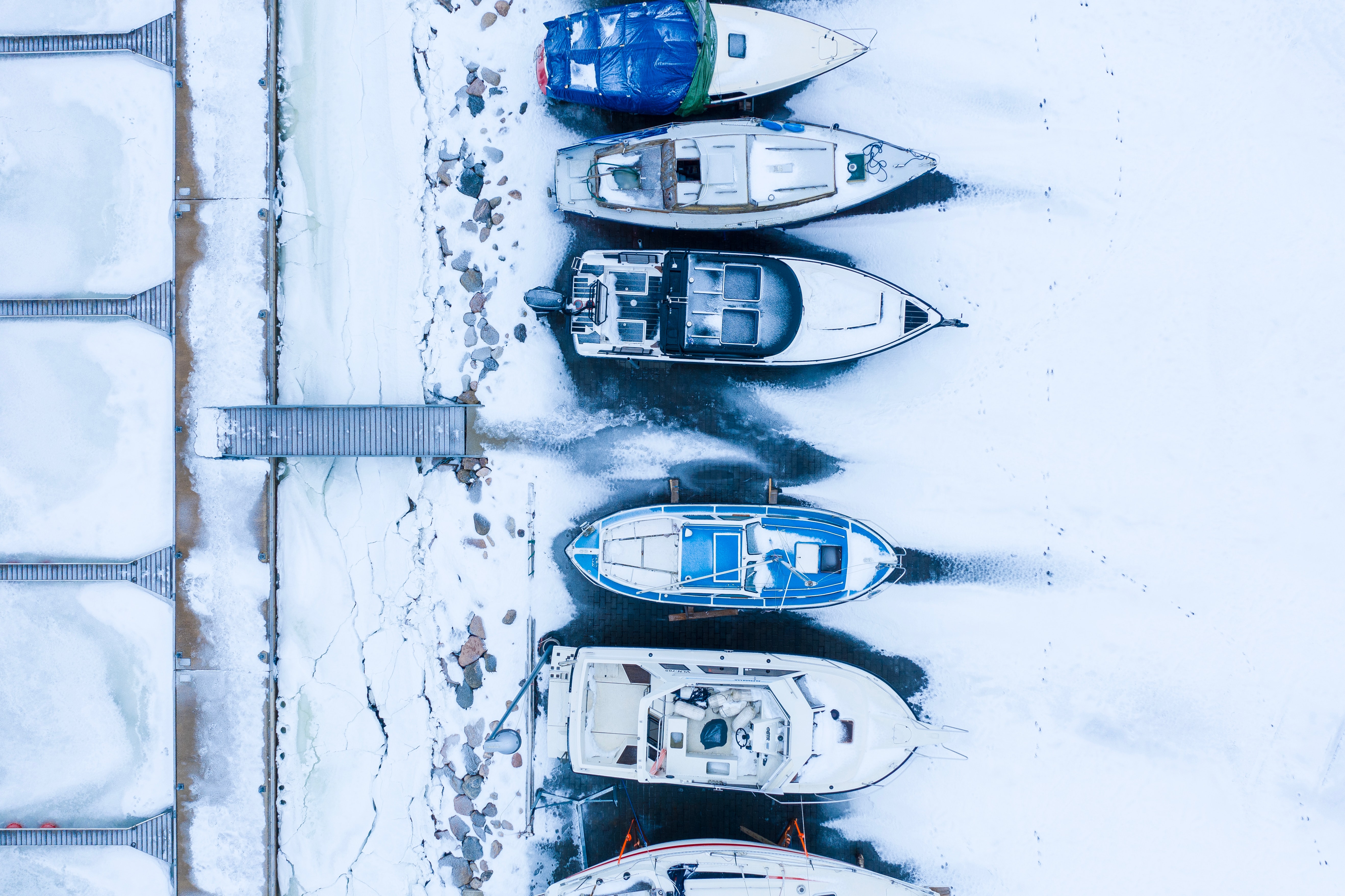Boating season generally runs from late April to early October, with June through August being the most popular months for cruising. As the season comes to an end, it’s critical that seasonal boaters prepare for the colder months ahead.
With the potential for freezing temperatures, heavy snowfall, and high winds, the foundation of winter preparedness is storage and maintenance. The more you can do ahead of time to prepare for inclement weather, the better off you’ll be if and when a winter storm hits.
So, are you ready for winter weather?
Make a Plan for Storage
When winter weather comes a-raging, it’s important to decide where your boat will be kept. Most marinas and boat owners agree that the safest choice is to have watercraft hauled ashore.
Even if you live somewhere where the water won’t freeze, you should still consider storing your boat during the off-season. Sustained exposure to cold water temperatures can cause your boat to wear down, rust, and discolor. Essentially, you’re subjecting it to more outdoor elements, which can lead to damage.
In terms of finding storage space, you can consider keeping it at home if you have a big enough property. It could be stored in a shed, garage, or even in a portable shelter kept on your lawn or in your driveway. If you decide to keep your boat on your property, be sure to cover it with a durable tarp to help fight off the elements.
There are also many options to purchase space through a boat storage facility if you don’t have room to store your boat on your property. These facilities typically have advanced security measures in place to protect against theft or vandalism.
Boat Winterization Basics
After making a storage plan, it’s time for some basic maintenance to protect your boat from winter mayhem.
Below you’ll find a quick refresher on how to winterize a boat. For something more extensive, check out our complete guide to boat winterization.
- First off, drain all old fuel and make sure there is no water in the gas tank. Stale or clogged fuel can damage the engine.
- Apply corrosion protection to your engine.
- Consult the owner's manual for specific instructions, and complete fogging, if necessary.
- Add a fuel-stabilizing additive to the fuel system. Then, run the engine.
- Change your engine’s fuel filters and any fuel/water separators in the system, if needed.
- Drain any freshwater plumbing systems (i.e., tanks, sinks, heads) and add antifreeze to the plumbing systems.
- Ensure water is removed from all other systems (i.e., livewells, bilge pump, raw water washdowns, etc.).
- Remove drain plugs.
- Take note of all safety equipment including lifejackets, flares, fire extinguishers, EPIRBs, and radios. Check expiration dates on all flares and fire extinguishers, and ensure that they are working properly.
- Look for damage and cracks along the boat, especially near the hull and surrounding areas.
Clean Your Boat
With the potential for mold, mildew, and corrosion, water poses one of the biggest threats to your boat during the off-season. So, it’s important to prioritize keeping water and moisture out as best you can. Cleaning your boat helps to ensure that it doesn’t corrode, rust, or attract mold and mildew.
You can clean your boat as you usually would after an outing, emptying out all perishables, clothing, and removable equipment. Make sure that you also clean the outside of the boat. Marine-specific soap and a soft-bristle brush should get the job done.
Make It Rust-Proof
After the boat is clean, apply a secure, weatherproof cover. Something well-fitted will help to prevent rust buildup (which commonly occurs when leftover saltwater on the boat comes in contact with cold, wet weather conditions). Your best bet is to shrink-wrap the boat, which places a thin polymer plastic film across the boat’s surface. It shrinks tightly over whatever it’s covering, helping to protect against the elements. For extra protection, you can also apply a rust solution on any exposed metal.
Visit Your Boat Throughout the Off-Season
Try to visit your boat monthly or bi-monthly if possible. That way, you can catch problems early, before they become increasingly dangerous to your boat.
Look for signs of corrosion, mold/mildew, cracks and holes, animals and insects. If you notice anything off, contact a marine expert immediately. The sooner you catch it, the less damage it will cause—and moreover, the less it will cost you in the end.
FAQs
Do I need boat insurance in the winter?
Year-round coverage comes highly recommended. Some boat owners are tempted to cancel coverage when the boat is no longer in use, but a lot can happen to a boat even in the off-season and out of the water. Think: fire, vandalism, theft, and freeze damage from winter storms. All can cause serious damage and require costly repairs.
If you prefer not to bear the entire cost of these exorbitant repairs, then boat insurance is most definitely recommended during the winter months. Remember that a boat is a major investment. Just like a house or a car, it’s important to protect those assets—whether they’re in use or not.
Does home insurance cover boats?
Some home insurers will cover small, non-motorized boats (like a canoe, kayak, or small sailboat). If you have a larger vessel, however, your home insurance will likely not offer coverage—even if the boat is on your property.
If you want proper coverage, opt for boat insurance. Boat insurance coverage typically protects against things like property damage, bodily injury, collision, theft, vandalism, and fire during both the on- and off-season.
How can I lower my boat insurance costs?
SkiSafe offers a discount to boats that are laid up during the off-season. This discount will lower boat insurance costs. To qualify, the vessel cannot be used and must remain fully covered throughout the duration of the lay-up period. It also must be properly winterized (not ready for immediate use).

